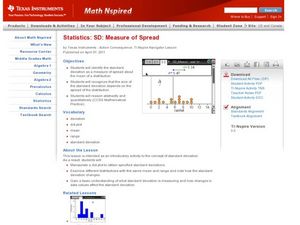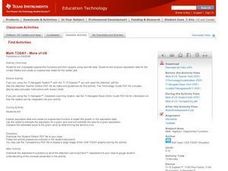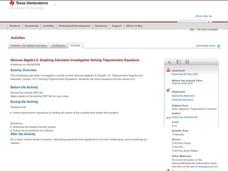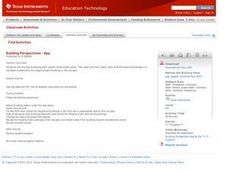Curated OER
Understanding Slope
Students find and define the slope of a line. In this algebra lesson,students differentiate between positive and negative slopes. They define the properties and slopes of vertical and horizontal lines.
Curated OER
Transformations: Dilating Functions
Students dilate functions using transformation. In this algebra lesson, students complete vertical dilation, stretch and shrink. They perform reflection across the x and y axis.
Curated OER
Transformations and Translation of Functions
Students translate functions horizontally and vertically. In this algebra lesson plan, students identify the parts of the formula that allows the graph to move left, right, up and down. They perform a transformation on the coordinate plane.
Curated OER
Perfect Shuffles
Students investigate piecewise functions. In this algebra instructional activity, students model piecewise functions in the real world. They graph the parts of the functions following the restrictions of the domain.
Curated OER
Trigonometric Transformations
Students perform transformation on trig functions. In this precalculus lesson, students relate the London Eye observation wheel to trig function. They use a TI navigator to visualise the parameter created by this view and relate it to...
Curated OER
Measure of Spread
Students identify the standard deviation. In this statistics instructional activity, students find the mean distribution and calculate the percent of deviation from the mean. They observe this change on the Ti calculator.
Curated OER
Confidence Levels
Students collect data and graph it. In this statistics activity, students rate confidence levels by collecting data and analyzing it. They graph their findings on the Ti calculator.
Curated OER
EE*Pro App
Scholars investigate EE*Pro App. In this secondary mathematics lesson, let your class explore an all-inclusive App for electrical engineering students. The App is organized into analysis, equations, and references.
Curated OER
ME*Pro App
In this secondary mathematics lesson, learners investigate the uses and capabilities of a TI-89 application designed for mechanical engineering students. The app contains over 700 pieces of reference information and organized into...
Curated OER
More of U.S.
Explore graphical representation of a real-life data set and determine the exponential regression model for the data in your classroom. Students also compare the estimated value to the given value by determining the percent error.
Curated OER
Exploring Functions with CAS
Your mathematicians will examine several conjectures regarding even and odd functions and investigate a formal proof of the conjectures using CAS.
Curated OER
Getting Started with the TI-Navigator™ System: What's My Rule?
Students explore linear relationships. In this sixth through eighth grade mathematics instructional activity, students explore the symbolic representation of verbal descriptions of mathematical rules defining the relationship between two...
Curated OER
Graph Polynomial Functions
Pupils explore a method of checking the sum or difference of polynomials by graphing the problem and the simplified answer and comparing the graphs.
Curated OER
Find Minimum and Maximum
Learners engage in a lesson about finding the values of different graphs written in the vertex form. They rewrite each quadratic equation in vertex form while graphing the equation with the visual display of a parabola that matches the...
Curated OER
Quadratic Function Graph
Learnerss engage in a study of quadratic functions and how the coefficient of x^2 has on the graph of it. They study the quadratic function for review with the help of index cards. The lesson includes a resource link to align the it with...
Curated OER
The Standard Form of A Quadratic Equation
Students investigate equations that are in the standard form of a quadratic equation represented as Y=ax2+bx+c. They factor the equations into linear factors to determine the x intercepts. The graph is also used to determine the x...
Curated OER
NUMB3RS Activity: Financial Futures
High schoolers discuss the calculated risk example in Numb3rs about a businesswoman from a company that made its money trading in futures. They use a formula given by the teacher to compute the estimated value of an investment after...
Curated OER
Solving Trigonometric Equations
Pupils will investigate trigonometric equations. In this trigonometry lesson, they explore solving equations using a TI-83 calculator and solve trigonometric equations by graphing each side of the equation as a function and locating the...
Texas Instruments
Serious Series
High schoolers are introduced to infinite series, geometric and telescoping series as well as the relationship between the sequence of partial sums of a series and its sum. They apply symbolic capacity of their calculator and calculus to...
Curated OER
Drawing Regular Polygons
Learners investigate properties of regular polygons. In this geometry lesson, your class will use a graphing calculator and parametric equations to construct regular polygons and investigate the relationship between the measure of...
Curated OER
Building Perspectives App
Learners explore a perspective application of the TI-73. In this middle school mathematics lesson, students view the front, back, right, and left views of a city to determine the height of each building in a city plan.
Texas Instruments
Golden Ratio Lab
Learners investigate the Golden Ratio in this algebra I or geometry lesson. They explore the Golden Ratio as the conduct an experiment in which they collect various measurement from their team members and find the regression equations...
Curated OER
Applied Fundamental Theorem of Calculus
Students apply the Fundamental Theorem of Calculus. In this calculus instructional activity, students identify the graphical connections between functions and accumulation functions. They use a TI to represent the functions.
Curated OER
Multiplying Inequalities by Negative
Students multiply inequalities by negative. In this algebra instructional activity, students solve inequalities and graph their solutions on a number line. They pay close attention to the negative consequence, which causes the sign to flip.

























